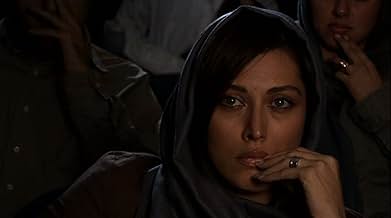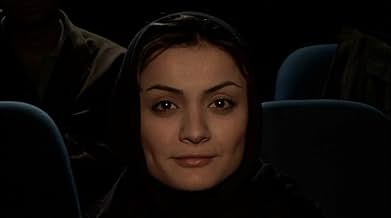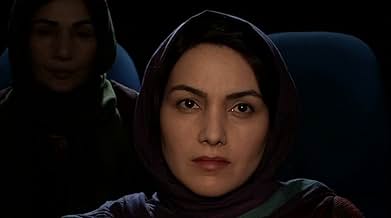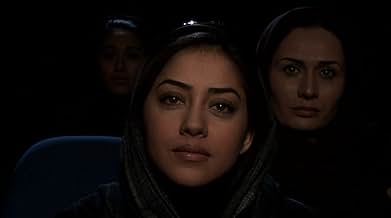Agrega una trama en tu idiomaWomen's expressions are captured as they watch Khosrow and Shirin, a 12th-century Persian play staged by Kiarostami, revealing their reactions to the unseen narrative.Women's expressions are captured as they watch Khosrow and Shirin, a 12th-century Persian play staged by Kiarostami, revealing their reactions to the unseen narrative.Women's expressions are captured as they watch Khosrow and Shirin, a 12th-century Persian play staged by Kiarostami, revealing their reactions to the unseen narrative.
- Dirección
- Guionista
- Elenco
- Premios
- 1 nominación en total
Zar Amir Ebrahimi
- Woman in audience
- (as a different name)
Vishka Assayesh
- Woman in audience
- (as Vishka Asayesh)
- Dirección
- Guionista
- Todo el elenco y el equipo
- Producción, taquilla y más en IMDbPro
Opiniones destacadas
Shirin (2008) is an Iranian film directed by Abbas Kiarostami. It's truly unique.
We watch an audience of women who are watching a movie about Khosrow and Shirin. That's the title of a famous tragic romance by the Persian poet Nizami Ganjavi (1141-1209). It's a famous poem in Iran. (There's a whole world out there of things that I don't know.)
In any case, the women are watching a movie. We can hear the music, the sound effects, and the dialog. But we never see the movie!
What we see are women's reactions to what they are seeing on the screen. When I looked into it, it turns out that Kiarostami filmed over 100 women. All of them were famous Iranian actors or other cinema professionals.
For example, one of the women was Leila Hatami, who later starred in the film A Separation (2011). I believe all of the women were Iranian except for one. She's a famous French actor who had worked with Kiarostami in 2010. If you watch carefully, you'll recognize her.
This movie has an anemic IMDb rating of 6.7. (I guess that you either buy into the concept, or you don't.) I thought it was much better than that, and rated it 8.
P.S. We viewed this film on a Cinema Guild DVD. It came with several extras, one of which is worth seeing--Taste of Shirin (2008).
We watch an audience of women who are watching a movie about Khosrow and Shirin. That's the title of a famous tragic romance by the Persian poet Nizami Ganjavi (1141-1209). It's a famous poem in Iran. (There's a whole world out there of things that I don't know.)
In any case, the women are watching a movie. We can hear the music, the sound effects, and the dialog. But we never see the movie!
What we see are women's reactions to what they are seeing on the screen. When I looked into it, it turns out that Kiarostami filmed over 100 women. All of them were famous Iranian actors or other cinema professionals.
For example, one of the women was Leila Hatami, who later starred in the film A Separation (2011). I believe all of the women were Iranian except for one. She's a famous French actor who had worked with Kiarostami in 2010. If you watch carefully, you'll recognize her.
This movie has an anemic IMDb rating of 6.7. (I guess that you either buy into the concept, or you don't.) I thought it was much better than that, and rated it 8.
P.S. We viewed this film on a Cinema Guild DVD. It came with several extras, one of which is worth seeing--Taste of Shirin (2008).
"Shirin" has not been released on DVD in Brazil and I was lured by the IMDb User Rating (7.0/10 with 464 votes) and three favorable reviews (one guy with 4 reviews, another with 6 reviews and one with 952 reviews) published by IMDb. Conclusion: I bought the imported DVD released by Cinema Gould distributor, with subtitles in English.
Unfortunately I was not able to see more than fifteen minutes of this annoying and pretentious recitation of a Persian poem showing the faces of Iranian women in the audience of a movie theater while they watch on the screen. Then I took a nap and I was not brave enough to rewind the film.
"Shirin" might be an interesting short, but NEVER a feature. Fans of Abbas Kiarostami may like "Shirin", but that is not my case; actually I hated it, since it gave me the sensation of being backwards to the screen snooping the audience. Probably Godard might be jealous for not thinking of such boring experimental cinema before. My vote is one (awful).
Title (Brazil): Not Available
Unfortunately I was not able to see more than fifteen minutes of this annoying and pretentious recitation of a Persian poem showing the faces of Iranian women in the audience of a movie theater while they watch on the screen. Then I took a nap and I was not brave enough to rewind the film.
"Shirin" might be an interesting short, but NEVER a feature. Fans of Abbas Kiarostami may like "Shirin", but that is not my case; actually I hated it, since it gave me the sensation of being backwards to the screen snooping the audience. Probably Godard might be jealous for not thinking of such boring experimental cinema before. My vote is one (awful).
Title (Brazil): Not Available
It's like reading the book of this mythological tale of Khosrow and Shirin's love from the expressions on the faces of the women watching the movie instead of plainly watching the movie itself.
So creative, so extraordinary, so poetic, so emotional, so fantastic...
Just as a note, there is a different but partly similar version of this old tale told in Turkey for ages known as "Ferhat and Sirin" in that Ferhat is stipulated to dig long channels and tunnels on the rocky mountains to bring water to the palace of the sultan as a precondition to marry with his doughter Sirin. Remains of some channels and tunnels in the city of Amasya is shown as a proof of this mythological love.
So creative, so extraordinary, so poetic, so emotional, so fantastic...
Just as a note, there is a different but partly similar version of this old tale told in Turkey for ages known as "Ferhat and Sirin" in that Ferhat is stipulated to dig long channels and tunnels on the rocky mountains to bring water to the palace of the sultan as a precondition to marry with his doughter Sirin. Remains of some channels and tunnels in the city of Amasya is shown as a proof of this mythological love.
Filmmakers like David Lynch or early Darren Aronofsky (Pi) have been branded as experimental, extreme, uncommercial. Okay, so their work is occasionally difficult, but at least they know how to reach out to the audience. Abbas Kiarostami's Shirin, on the other hand, gives a new definition to the adjective "experimental", its style being so radical no marketing campaign in the world would be able to endorse it outside a film festival like Venice (which is where I saw the film).
Kiarostami, always a festival favorite, has truly gone where no man's ever been before with his adaptation of a classic Persian story from the twelfth century. The predictably sad tale revolves around a woman, Shirin, and her being coveted by two different men. A yarn as old as humanity, most will say. What can the director do to make it fresh and original?
The answer is of the most audacious kind: instead of doing a straightforward movie, Kiarostami chose to film a stage version of the story, with a twist - we never actually see what happens on the stage. The whole 90-minute bulk of the film consists of a series of close-ups of over a hundred Iranian women (plus Juliette Binoche in a three-shot cameo) who are watching the play. All the action takes place off-camera, with voices and sounds allowing us to imagine what we should be looking at.
With such an unconventional approach, Shirin is very simple and at the same time quite difficult. Few, if any, average moviegoers will choose it over something more traditional, and those who do will almost certainly find it boring. That's a pity, because the extreme style does serve a point, although it isn't entirely clear at first. The key to understanding the picture lies in focusing only on the actresses' faces: the minute one stops paying attention to the soundtrack (I was helped in that by the fact that the subtitles were faulty and didn't show up until 40 seconds after the lines had been spoken), it becomes easier to appreciate the simple beauty of Kiarostami's choice and feel a kind of empathy with those women, as if they were the real protagonists (and in a way, they are).
So yes, Shirin is perhaps the most uncommercial film that will ever have been made, but since when does that translate as "unwatchable"? It's an acquired taste, for sure, but after the initial wave of frustration it might be possible to feel a more positive emotion kick in.
Kiarostami, always a festival favorite, has truly gone where no man's ever been before with his adaptation of a classic Persian story from the twelfth century. The predictably sad tale revolves around a woman, Shirin, and her being coveted by two different men. A yarn as old as humanity, most will say. What can the director do to make it fresh and original?
The answer is of the most audacious kind: instead of doing a straightforward movie, Kiarostami chose to film a stage version of the story, with a twist - we never actually see what happens on the stage. The whole 90-minute bulk of the film consists of a series of close-ups of over a hundred Iranian women (plus Juliette Binoche in a three-shot cameo) who are watching the play. All the action takes place off-camera, with voices and sounds allowing us to imagine what we should be looking at.
With such an unconventional approach, Shirin is very simple and at the same time quite difficult. Few, if any, average moviegoers will choose it over something more traditional, and those who do will almost certainly find it boring. That's a pity, because the extreme style does serve a point, although it isn't entirely clear at first. The key to understanding the picture lies in focusing only on the actresses' faces: the minute one stops paying attention to the soundtrack (I was helped in that by the fact that the subtitles were faulty and didn't show up until 40 seconds after the lines had been spoken), it becomes easier to appreciate the simple beauty of Kiarostami's choice and feel a kind of empathy with those women, as if they were the real protagonists (and in a way, they are).
So yes, Shirin is perhaps the most uncommercial film that will ever have been made, but since when does that translate as "unwatchable"? It's an acquired taste, for sure, but after the initial wave of frustration it might be possible to feel a more positive emotion kick in.
This is an amazing film.
I knew very little about it when I went except that 'all it showed' was a lot of women's faces watching a film ... What I experienced, however, was a brilliant - and daring - piece of multi-layered cinema. Yes, 'all we watch' are the faces of a group of 140 (apparently) Iranian women - plus Juliet Binoche - watching the traditional story of Shirin, an Armenian Queen.
We hear the soundtrack (and, in my case, read the subtitles) and see the women's reactions. But we never see what they see. They are looking past and beyond us.
The first thing that strikes one is the beauty of - and in - the faces of these women - and how beautifully Kiarostami lights and shoots them. Not to mention the complex and subtle rhythms of the edit. Women from their late teens into their sixties achingly expressive like renaissance portraiture ...Holbein or Velasquez or some of the Dutch masters come to mind ... And even after is had dawned that some, or perhaps all, of these faces might belong to actresses, each cunningly made up, the layers of the film, for me, only deepened: here, after all, is the dialectic of actors being watched - 'as themselves'.
Because, we wonder, are they aware that they are being filmed, watched? Of course. Kiarostami would have explained the set-up to them. That must be why he has managed to persuade so many famous and attractive Iranian women actors to take part; what a show reel for them! But through this choice, the director allows us to watch them while wondering how much they might, at any one point, be 'acting'? How much they are aware from moment to moment, these 'fakers', these 'deceivers', that they are being observed? And when, as they become engrossed in elements of the story, they forgot? And become 'themselves'.
And they do become engrossed. The tears flow. As did mine - watching their tears. They flinch when swords scythe, when heads and hands are chopped off. They lower their eyes with a memory of their own. Or in horror. They smile with recognition. Their faces light up. Darken.
So much is shown. But so much is not revealed. So much work is left to our imaginations.
And of course, there is the whole layer of these women being Iranian. A culture we don't know. Or think we know and dismiss out of hand, or patronise out of our ignorance. Every one of the women - even Juiette Binoche - is wearing a headscarf, headscarves that themselves become expressive of the wearer's individuality. How they drape them. Each one, like each face, unique. How each scarf lies. How each scarf frames the face. How the women themselves move the folds and adjust them, or play with, or arrange the material, unconsciously, as they watch...
And on another level, a deeper level, it's a great choice of Kiarostami's, that the film they are watching is about Shirin, a strong women, a lover, a hero Queen - an epic story crammed with sex, passion, betrayal, longing, lust and all expressed in the most heightened language and emotion. Because, as we watch these women watching, we know that they have, collectively, experienced all of this. Their eyes tell us that. Their tears. Their little smiles of recognition. Their open and child-like faces.
This is the ultimate success of the film. We meet 140 Iranian women. And one French one - also a clever choice ... We have a chance to watch them intimately. We, in the dark, watch them in the dark, watching. We fall in love with them; no less so the older ones, whose faces are etched with life. We know, young and old, they have all lived and had lives and loves and children, some of them, and grief and failures and loss and triumph over odds. And yet we know nothing of their stories. The details. Yet yearn to know them. The unknowable.
This is a film which gives the lie to a million clichés and 'certainties' about Iran, and 'freedom' and Islam and 'The Other'. I do recommend people to find a place to see it. But in a cinema. On a big screen. After all, it's an epic - but on a vibrantly human scale.
I knew very little about it when I went except that 'all it showed' was a lot of women's faces watching a film ... What I experienced, however, was a brilliant - and daring - piece of multi-layered cinema. Yes, 'all we watch' are the faces of a group of 140 (apparently) Iranian women - plus Juliet Binoche - watching the traditional story of Shirin, an Armenian Queen.
We hear the soundtrack (and, in my case, read the subtitles) and see the women's reactions. But we never see what they see. They are looking past and beyond us.
The first thing that strikes one is the beauty of - and in - the faces of these women - and how beautifully Kiarostami lights and shoots them. Not to mention the complex and subtle rhythms of the edit. Women from their late teens into their sixties achingly expressive like renaissance portraiture ...Holbein or Velasquez or some of the Dutch masters come to mind ... And even after is had dawned that some, or perhaps all, of these faces might belong to actresses, each cunningly made up, the layers of the film, for me, only deepened: here, after all, is the dialectic of actors being watched - 'as themselves'.
Because, we wonder, are they aware that they are being filmed, watched? Of course. Kiarostami would have explained the set-up to them. That must be why he has managed to persuade so many famous and attractive Iranian women actors to take part; what a show reel for them! But through this choice, the director allows us to watch them while wondering how much they might, at any one point, be 'acting'? How much they are aware from moment to moment, these 'fakers', these 'deceivers', that they are being observed? And when, as they become engrossed in elements of the story, they forgot? And become 'themselves'.
And they do become engrossed. The tears flow. As did mine - watching their tears. They flinch when swords scythe, when heads and hands are chopped off. They lower their eyes with a memory of their own. Or in horror. They smile with recognition. Their faces light up. Darken.
So much is shown. But so much is not revealed. So much work is left to our imaginations.
And of course, there is the whole layer of these women being Iranian. A culture we don't know. Or think we know and dismiss out of hand, or patronise out of our ignorance. Every one of the women - even Juiette Binoche - is wearing a headscarf, headscarves that themselves become expressive of the wearer's individuality. How they drape them. Each one, like each face, unique. How each scarf lies. How each scarf frames the face. How the women themselves move the folds and adjust them, or play with, or arrange the material, unconsciously, as they watch...
And on another level, a deeper level, it's a great choice of Kiarostami's, that the film they are watching is about Shirin, a strong women, a lover, a hero Queen - an epic story crammed with sex, passion, betrayal, longing, lust and all expressed in the most heightened language and emotion. Because, as we watch these women watching, we know that they have, collectively, experienced all of this. Their eyes tell us that. Their tears. Their little smiles of recognition. Their open and child-like faces.
This is the ultimate success of the film. We meet 140 Iranian women. And one French one - also a clever choice ... We have a chance to watch them intimately. We, in the dark, watch them in the dark, watching. We fall in love with them; no less so the older ones, whose faces are etched with life. We know, young and old, they have all lived and had lives and loves and children, some of them, and grief and failures and loss and triumph over odds. And yet we know nothing of their stories. The details. Yet yearn to know them. The unknowable.
This is a film which gives the lie to a million clichés and 'certainties' about Iran, and 'freedom' and Islam and 'The Other'. I do recommend people to find a place to see it. But in a cinema. On a big screen. After all, it's an epic - but on a vibrantly human scale.
¿Sabías que…?
- TriviaAccording to some reports, the women were filmed individually in Kiarostami's living room, with the director asking them to cast their gaze at a mere series of dots above the camera.
- ConexionesReferenced in Taste of Shirin (2008)
Selecciones populares
Inicia sesión para calificar y agrega a la lista de videos para obtener recomendaciones personalizadas
- How long is Shirin?Con tecnología de Alexa
Detalles
Taquilla
- Total a nivel mundial
- USD 26,302
- Tiempo de ejecución1 hora 32 minutos
- Color
- Mezcla de sonido
- Relación de aspecto
- 1.85 : 1
Contribuir a esta página
Sugiere una edición o agrega el contenido que falta

Principales brechas de datos
By what name was Shirin (2008) officially released in Canada in English?
Responda


































